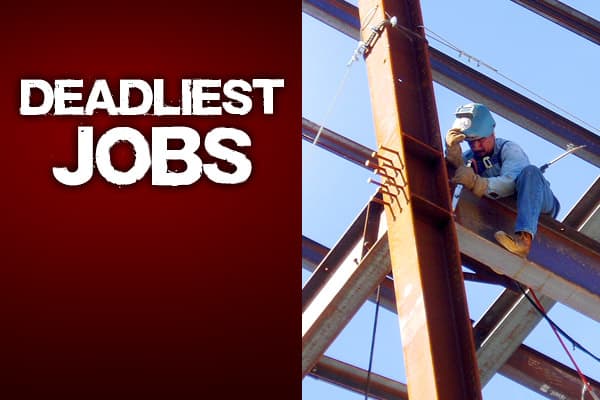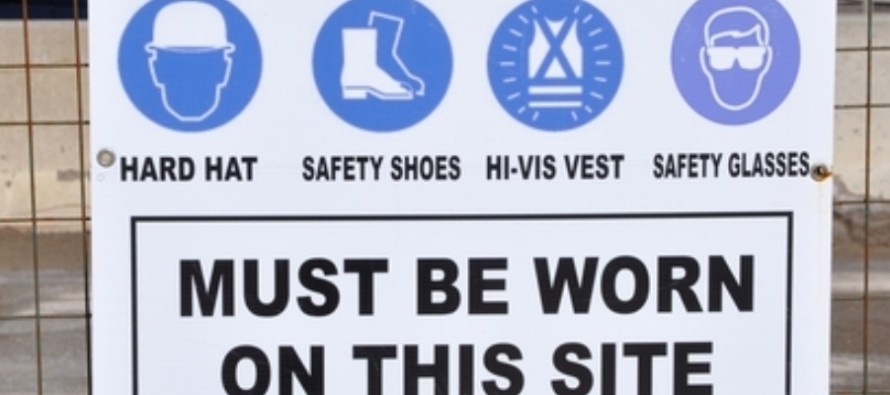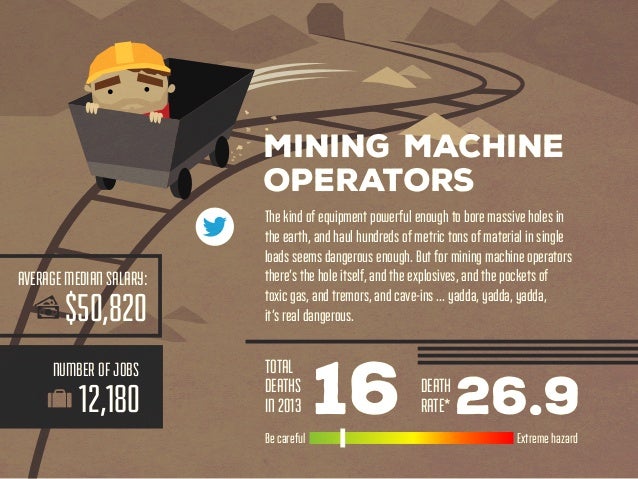The Deadliest and Unhealthiest Jobs of 2015
 So get this: apparently, working at some jobs may not be very healthy for you! Gasp! Who knew?! Well, the Internet, of course. And you, as soon as you check out which jobs are to die for these days, and which are merely (literally!) sick…
So get this: apparently, working at some jobs may not be very healthy for you! Gasp! Who knew?! Well, the Internet, of course. And you, as soon as you check out which jobs are to die for these days, and which are merely (literally!) sick…
The list of the world’s deadliest jobs doesn’t exist yet, but at least two countries have had the dubious honour of having some of the most lethal employment opportunities globally. One recent data analysis shows that many jobs seem to be dangerous, but are really not, while others that look innocuous boast a huge death toll. Without much ado, let’s jump in.

The top deadly jobs in the US were carefully selected by Bureau of Labor Statistics basing on the reported 4500 workplace fatalities in 2013. If these figures are anything to go by, the number of fatalities overall is dropping, but the exact circumstances stay more or less the same. This means that some jobs are always riskier than others. A handy infographic sums up the research, but you can also read about the list in detail in the official PDF. So whose job is the deadliest one nowadays?
#1: Lumberjacks. Almost sixty men died in 2013 in accidents related to felling timber. With a fatality rate of 91.3, the profession is indeed, the epitome of man vs. wild. Surprisingly, the job carries higher possible risks than that of an aircraft pilot, army man or police officer. Not quite the lumbersexual ideal, then, eh? Perhaps it’s best to just dress in flannel and grow a nice, bushy beard, but stay as far away from the woods as possible.

#2: Fishermen and anyone related to the fishing industry, e.g. trawler captains. Twenty-seven fishery workers died in 2013 in accidents at sea, while operating machines and during storms. Their fatality rate is „just” 75, but that just means that they are inviting death just a little less often than lumberjacks. If you’re thinking about a career with marine wildlife, how about a nice, safe aquarium at a desk job instead? It’s got all of the excitement with none of the deadly gale-force winds and stomach-churning sea storms.
#3: Pilots, especially civilian and cargo fixed-wing aircraft. This is still considered one of the sexiest professions for a man to have, and one of the most prestigious one for a woman, but, alas, at a very high risk to life and limb. The job may be dangerous 50.1 percent of the time and 64 people died in 2013 while transporting people or goods by air. Well, people were never truly meant to fly, right? I’ll stay on the ground for now, thank you very much.

#4: Construction workers, especially roofers. Safety first is not an empty slogan, but many in this line of work still make light of possible accidents. And even with all the precautions and safety mechanisms, many types of equipment are inherently deadly in the hands of inattentive workers. Whether through negligence or by sheer accident, there were 72 roofing and construction-related deaths in 2013, giving this job a lethality rating of 40.5. Hard hats and goggles, guys. Remember!
#5: Waste management specialists, specifically people hired to collect garbage and recyclable materials. They say that no job’s too menial or too dirty, and that money doesn’t smell — and this may hold true in our age. However, statistics are what they are: 33 refuse collectors died in the line of duty in 2013, making dustman one of the most hazardous professions. In fact, dangers are twofold here, with the job coming very high on an infections/health risk list (below) as well. Because of this rather alarming combination of direct danger and indirect risk of contamination, the job currently holds a death rating of 33.

#6: Mining machine operators, especially heavy drilling and quarry machinery. Much like the construction workers, sturdy men operating very large and mean-looking devices are at a very high risk of injury and death. Thankfully, they earn a very substantial pay (much like their oil rig cousins) and are made aware of the dangers when they sign up. Still, at 16 deaths a year in 2013 and with a fatality rating of 26.9, the risks need to be weighed against possible rewards when entering this field of employ.

#7: Drivers – this includes long-haul, freight and passenger drivers. Robert De Niro may have proven once and for all that driving a cab may be very bad for your health, but even such a seemingly benign job as a lorry driver nowadays poses a significant threat to your life. Long hours, endless roads and a lot of stressful situations make for a deadly combination when you’re at the wheel of a twenty-ton steel behemoth barrelling down the road at a hundred miles per hour. A whopping 800 people died in 2013 on the road while transporting their designated cargo, but because of the size of the industry, this is still a pretty small proportion of the whole. This is why the lethality index of this class of jobs is at a measly 23.6 despite hundreds dying.

#8: Farmers – this includes anyone with a job directly linked to agriculture, crops, dairy and livestock handling. You’d think that taking the bull by the horns and going for greener pastures would be good for your health. Well, you’d be dead wrong. Or just dead, as more than 230 people were in 2013 as a result of a variety of accidents involving farming equipment, disease and the elements. Still, much like the drivers, the industry is so vast and diverse that the amount of total deaths reported is relatively small. This means the job holds a rather safe index of 22.9. So if you really have to pick a profession that makes you look all manly (or, if you’re a woman, independent and strong), choose farming. It offers less chances of kicking the bucket on the job and plenty of fresh air to boot. What’s not to like (apart from a chance of dying)?
All right, so this was a list of most dangerous, deadly US jobs. What about the UK, then? Are people safe at work there, or is NSFW an acronym that applies to actual jobs? Apparently, there’s little in the way of extensive research into lethality of jobs, but there’s a similar list that groups jobs by their health hazards. The recently published statistics from the office of the Health and Safety Executive put number of work-related deaths in the UK this year at 142, which is a slight increase on the previous year. Metro combined these figures with data on illnesses and injuries sustained at the workplace over the year to come up with a list of truly dangerous jobs. Their findings bear some striking similarities to the list of the most deadly jobs in the US. Let’s take a look, shall we?
First on the list: Farmers again! Their industry as a whole is already in trouble in the UK, and this revelation will only make things worse. Thirty-three people have died between 2014-2015 while working fields, crops or livestock. On top of that, farmers’ accidents and illness index sits uncomfortably high at 4.3 percent. This means that out of every 100 people working in the agriculture industry, four may contract a disease, get seriously injured or incapacitated in the coming year. These are not the odds you look for when you opt for farming as your profession!
Construction workers come next on the list, though. This comes as no surprise, considering they work with dangerous materials (e.g. explosives, corrosive chemicals, paint etc.) and machinery. Around 35 people have died in 2015 while working in the construction sector, and the injury/illness percentage is still a very high 3.1. Since in the US they rank 4th in overall lethality, perhaps American safety regulations are a tad better?

Well, it seems this way considering the UK drivers, who are ranked next on the list. In the US their corresponding lethality index puts them at no. 7, whereas here it’s a proud „third most dangerous”, though clearly this is not something you’d be bragging of any time soon. At injury rate of 2.6 and nine casualties this year, HSE deems it slightly less dangerous than being a professional soldier or a police constable. It’s probably the side of the road they have to drive on… Yeah, that must be it!
Alas, even if you have a job far away from the main road, chances are you’re working in a veritable minefield of possible accidents and injuries. Such is the lot of the UK’s many manufacturing workers. The assembly line employees have it really rough: 16 people dying in their line of duty at the manufacturing facilities across the UK in 2015, and the injury/illness rate is only 0.2 percentile point less than that of the drivers.

And here’s the most surprising entry on the list: healthcare and social care professionals. Though they’re clearly working in a better environment, they are still lumped together with the likes of construction workers and farmers. This is because medical professionals are constantly exposed to disease and various health hazards related to handling nuclear material, biohazard waste, drugs and toxic substances. While there very few reported deaths resultant from working in such place, healthcare workers have the highest illness rate of them all, a whopping 4.6 percent, with further 5 percent claiming they became ill because of their profession. They might be pulling a sickie for all we know, though a recent threat of strikes makes it rather unlikely.

But of course, you don’t have to pretend to be sick if you’re waist-deep in garbage and human waste. Last on the UK’s list of most dangerous occupations is waste management, where a gigantic 8000 workers this year reported contracting a sickness due to their smelly, rotten and dirty work environment. Conditions are harsh for garbage men and sewer technicians, leading to an abysmal illness rating of 4 percent, one of the higher ones on the list. But just like their trash-collecting brethren across the ocean, so do these men (and women) do very necessary, very important work, risking their lives and health. However, considering the relative positions on the two lists, the UK’s waste disposal specialists seem to have it a little better.
Which brings us to the end of the list, finally. So, now that this grim business is over, what are your thoughts? Are you in one of these professions? It would be interesting to hear from an actual person employed in one of the abovementioned industries to hear first-hand accounts of possible dangers — or lack thereof — in the line of duty.
VOCABULARY
gasp! – tu: och!
sth to die for – coś wymarzonego
merely – ledwie, tylko
literally – dosłownie
dubious – wątpliwy
lethal – śmiertelny
innocuous – niewinny, niegroźny
to boast sth – (móc) się czymś pochwalić, szczycić się czymś
death toll – ilość ofiar śmiertelnych
without (much) ado – bez (zbędnych) ceregieli
labor – praca (US)
fatality – ofiara śmiertelna
figures – liczby, dane
if sth is anything to go by… – jeśli wierzyć czemuś, to…
exact – dokładny, konkretny
handy – praktyczny, przydatny
infographic – infografika, obrazek z informacjami
to sum sth up – podsumować coś
research – badanie, badania
in detail – w szczegółach, szczegółowo
lumberjack – drwal
related to X – związany z X
to fell timber – ścinać/wycinać drzewa
rate – wskaźnik, indeks
epitome – uosobienie, typowy przykład czegoś
man vs. wild – człowiek kontra dzika przyroda
to carry a risk – nieść ze sobą pewne ryzyko
aircraft – statek powietrzny, samolot
bushy – krzaczasty (np. broda, brwi)
trawler – trawler, statek rybacki
fishery – łowisko, rybołówstwo
to operate machines – obsługiwać maszyny
to invite death – prosić się o śmierć, napraszać
marine wildlife – zwierzęta morskie
excitement – poruszenie, (wielkie) emocje
gale-force winds – wichury
stomach-churning – przyprawiający o nudności, przewracający w żołądku (tylko przed rzeczownikiem)
civilian – cywilny
cargo – towar (do transportu), ładunek
fixed-wing – stałopłat, o nieruchomym płacie skrzydła (o typie jednostek latających)
to consider sth sth – uważać coś za coś/jakieś
prestigious – prestiżowy
alas – niestety (arch., form.)
life and limb – (czyjeś) zdrowie i życie
roofer – dekarz
safety first – bezpieczeństwo nade wszystko
line of work – rodzaj pracy, rzemiosło
to make light of sth – lekceważyć coś
precaution – zabezpieczenie, środek ostrożności
equipment – wyposażenie, sprzęt
inherently – tu: z natury, sam z siebie
inattentive – nieuważny
negligence – zaniedbanie
sheer accident – czysty/zwykły przypadek
hard hat – kask
waste management – zarządzanie odpadami
to collect garbage – zbierać śmieci
menial – niewdzięczny (o pracy)
to hold true – być prawdą
refuse collector – śmieciarz (UK, form.)
in the line of duty – w trakcie wykonywania obowiązków (służbowych)
dustman – śmieciarz (UK, pot.)
hazardous – niebezpieczny
twofold – dwojaki
indirect – pośredni
contamination – zanieczyszczenie, skażenie
mining – górniczy
drilling – wiertniczy
quarry – związany z kamieniołomem
sturdy – mocny, silny
mean-looking – paskudnie wyglądający
device – urządzenie
injury – uraz, skaleczenie
substantial – pokaźny, spory
oil rig – platforma wydobywcza/wiertnicza
to make sb aware of sth – uświadomić komuś coś
to sign up – zapisywać się (np. do pracy)
to weigh risks against the rewards – rozważyć wszystkie za i przeciw, sprawdzić, czy ryzyko nie jest zbyt duże w porównaniu do nagrody
field of employ – obszar zatrudnienia, branża, w której się pracuje
long-haul – na długie dystanse, długodystansowy (tylko przed rzeczownikiem)
freight – fracht
once and for all – raz na zawsze
cab – taksówka
benign – łagodny, niegroźny
lorry – ciężarówka (UK)
to pose a threat to sth – stanowić zagrożenie dla czegoś
at the wheel – za kółkiem
behemoth – gigant, moloch
to barrel down the road – pędzić/pruć ulicą (o dużej ciężarówce, wielkim pojeździe)
whopping – gigantyczny, ogromny
designated – wyznaczony
proportion – ułamek, odsetek
despite – pomimo
agriculture – rolnictwo
crops – uprawy
dairy – tu: mleczarnie
livestock – bydło, trzoda
handling – zajmowanie się (czymś), obchodzenie się (z czymś)
to take the bull by the horns – chwycić byka za rogi
greener pastures – tu: nowe horyzonty
dead wrong – kompletnie mylny, absolutnie nieprawdziwy
as a result of sth – w wyniku czegoś
a variety of sth – (duży) wybór czegoś
involving – dotyczący, związany z
disease – choroba
the elements – żywioły, warunki atmosferyczne
vast – rozległy
diverse – różnorodny, zróżnicowany
relatively – stosunkowo, względnie
to pick – wybrać
manly – męsko (np. wyglądać)
to kick the bucket – kopnąć w kalendarz
to boot – na dodatek
NSFW (not safe for work) – uwaga na treści nieprzyzwoite/drastyczne (ostrzeżenie przy przeglądaniu pewnych treści w trakcie pracy)
acronym – akronim, skrót
to apply to sth – stosować się do czegoś, mieć zastosowanie
there’s little in the way of sth – nie jest za dużo/wiele czegoś
extensive – szeroki, szeroko zakrojony
Health and Safety Executive (HSE) – inspektorat BHP (UK)
slight – niewielki, nieznaczny
illness – choroba
to sustain (an injury) – doznać (urazu), odnieść (obrażenie)
findings – wniosek (badania), wynik
striking – uderzający
to bear similarities to sth – być podobnym do czegoś, mieć podobieństwo (z czymś)
revelation – objawienie
uncomfortably – niewygodnie, nieprzyjemnie
to contract (a disease) – złapać (chorobę), zarazić się
incapacitated – obezwładniony, niezdolny do pracy
odds – szanse
to opt for sth – optować za czymś, wybierać coś
to come as no surprise – nie być dziwnym, nie dziwić
considering… – zważywszy na/że…
explosives – materiały wybuchowe
corrosive chemicals – żrące chemikalia
to rank X – zajmować X miejsce
overall – ogólny, łączny
a tad – odrobinę, ciut
corresponding – odpowiadający, analogiczny
whereas – podczas gdy
to brag – chwalić się
casualty – ofiara (np. wypadku)
police constable – posterunkowy (UK)
chances are… – są duże szanse, że…
veritable – istny, prawdziwy
minefield – pole minowe
lot – los, dola
manufacturing – produkcja
assembly line – linia montażowa
rough – ciężki, trudny
facility – zakład (np. produkcyjny)
percentile point – punkt procentowy
entry – kandydat, uczestnik
to lump sb together with sb – wrzucić kogoś do jednego worka z kimś
the likes of sb – ludzie tego typu, ludzie takiego pokroju (jak)
exposed to sth – wystawiony na coś, narażony
resultant from sth – w wyniku czegoś
to claim – twierdzić
to pull a sickie – udawać chorego, żeby nie iść do pracy (pot., UK)
unlikely – mało prawdopodobny
to pretend – udawać
waist-deep – po pas (w czymś)
due to sth – z powodu, przez coś
rotten – gnijący, zgniły
harsh – surowy, ciężki
garbage man – śmieciarz (US)
sewer – kanalizacja, ściek
abysmal – fatalny, okropny
trash – śmieci
brethren – bracia, brać
grim – ponury, mroczny
abovementioned – wyżej wspomniany
first-hand account – relacja z pierwszej ręki
thereof – tego, o którym mowa, z tego
by Prochor Aniszczuk







